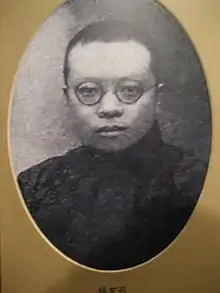Qian Xuantong
Qian Xuantong (1887—January 17, 1939) was a Chinese linguist and writer. He was a professor of literature at National Peking University,[1] and along with Gu Jiegang, one of the leaders of the Doubting Antiquity School.
| Qian Xuantong | |
|---|---|
 Qian Xuantong | |
| Traditional Chinese | 錢玄同 |
| Simplified Chinese | 钱玄同 |
| Hanyu Pinyin | Qián Xuántóng |
| Gwoyeu Romatzyh | Chyan Shyuantorng |
| Wade–Giles | Ch’ien Hsüan-t’ung |
| Birth name: Qian Xia | |
| Traditional Chinese | 錢夏 |
| Simplified Chinese | 钱夏 |
| Hanyu Pinyin | Qián Xià |
| Gwoyeu Romatzyh | Chyan Shiah |
| Wade–Giles | Ch'ien Hsia |
| Courtesey name: Deqian | |
| Traditional Chinese | 德潛 |
| Simplified Chinese | 德潜 |
| Hanyu Pinyin | Déqián |
| Gwoyeu Romatzyh | Derchyan |
| Wade–Giles | Te-ch'ien |
Biography
Born in Huzhou, Zhejiang, Qian was named Qian Xia at birth and was given the courtesy name Deqian (德潜). Qian trained in traditional Chinese philology. After receiving his university education in Japan, Qian held a number of teaching positions in mainland China. He was a student of Zhang Binglin; some of Zhang's works were copied and printed in Qian's remarkable seal script handwriting. As a philologist, Qian was the first to reconstruct the vowel system of Old Chinese in IPA.
A close friend of Lu Xun, Qian was a key figure in the May Fourth Movement and the New Culture Movement. Despite his close relationship with the Chinese classics, he promoted the abolition of classical Chinese. He was also a strong supporter of Esperanto, at one time even proposed the substitution of Chinese by it.[1][2] An open letter he wrote in response to an anti-Confucian essay of Chen Duxiu stated:[1]
Dear Mr. Chen, In an early essay of yours you strongly advocated the abolition of Confucianism. Concerning this proposal of yours I think that it is now the only way to save China. But upon reading it I have thought of one more thing: if you want to abolish Confucianism you must first abolish the Chinese [written] language. If you want to get rid of the average person's childish, uncivilized, obstinate way of thinking, then it is all the more essential that you first abolish the Chinese language. To abolish Confucianism and eliminate Taoism is a fundamental way to prevent the fall of China and to allow the Chinese to become a civilized nation in the twentieth century. But a more fundamental way than this is to abolish the written Chinese language, in which Confucian thoughts and fallacious Taoist sayings are recorded.
Chen thought that abolishing written Chinese would destroy the spoken language as well and countered Qian's proposal by suggesting that Chinese could use a Roman alphabet.[1]
He and Liu Bannong did their best to promote vernacular Chinese, attacking such classical Chinese stylists as Lin Shu. His skepticism of the Chinese heritage was such that he at one time wanted to change his surname to Yigu (疑古 "suspecting things ancient"). He also did much important work with regards to the standardization of Simplified Chinese characters, Mandarin, and the design of pinyin.
His son Qian Sanqiang was a nuclear physicist who contributed to development of nuclear weapons in China.
References
- He Jiuying 何九盈 (1995). Zhongguo xiandai yuyanxue shi (中囯现代语言学史 "A history of modern Chinese linguistics"). Guangzhou: Guangdong jiaoyu chubanshe.
- Wu Rui 吳銳 (1996). Qian Xuantong pingzhuan (钱玄同评传 "A Biography of Qian Xuantong"). Nanchang: Baihuazhou wenyi chubanshe.
- Moser, David (2016). A Billion Voices. Penguin Books. pp. 34–36.
- DeFrancis, John (1950), "chapter 4: One State, One People, One Language", Nationalism and Language Reform in China, Princeton University Press
External links
- Works by or about Qian Xuantong in libraries (WorldCat catalog)